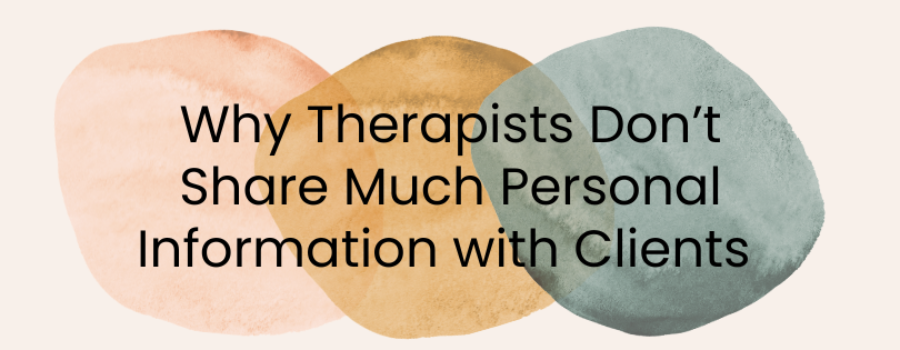Author Leslie Vernick says that all healthy adult relationships need three essential ingredients to thrive: reciprocity, mutuality, and freedom (From The Emotionally Destructive Marriage). The counseling relationship can often become one of the deepest a person has in their life. It can also feel strange because clients will share personal information with a therapist, but they know very little personal information about their therapist. This is one of those relationships where it isn’t actually reciprocal in nature.
With a friendship or partnership, the goal would be to have those three essential ingredients, at the least. To share with another and they share in return. To spend time together and know one another well. But that’s not the nature of the client/therapist relationship. And it’s not supposed to be, no matter how fun it’d be to be friends with your counselor ;).
Many clients will ask me personal questions. Sometimes because I’ve already chosen to disclose various things because I believe it could be therapeutic in that moment. At times, those questions from clients can feel invasive, but most of the time it just seems like they’d like to know me like I know them. But I can’t share most things about my life with clients. I’m not trying to be evasive or hide who I am in a dishonest way, but this isn’t that kind of relationship. The kind where there is a give and take of personal information. And some clients might feel confused by that, maybe even offended or hurt. Some might also believe reciprocity is owed to them in some way. “I am sharing all of this with you, and I don’t even know you.” I can see how vulnerable of a place that can be for a client.
However, there are reasons why therapists keep their personal lives out of the counseling room. Here are a couple of those reasons:
1. It’s not their therapy.
That’s what I tell people all the time at the beginning. It’s not my therapy; it’s yours. I usually say that in the context of asking them to tell me if it’s not a good fit so I can help them with a referral. But it’s also true that this person is coming to me for help, not the other way around. Counselors need their own friends, therapists, or partners with whom to discuss personal issues. It is not professional (or ethical) for them to use someone else’s time to process their own issues. It is acceptable for a therapist to disclose some personal things only if it serves a therapeutic purpose and can help a client move forward.
2. It is a professional relationship.
As weird as this sounds for the client because they are the one sharing everything about their lives with the therapist, the truth remains that it is a professional relationship. Meaning, the relationship doesn’t extend past the counseling session or the counseling room. And therapists are paid for their services due to their expertise and training. One doesn’t pay a friend to have a deep conversation or for them to help them with difficulties.
Also as counselors, ethically we are to avoid dual relationships as much as possible. That means we strive to not have any other form of relationship with a client other than the professional one. This is not to show unkindness to a client or hurt them in any way; instead, it is for their protection. The therapeutic relationship is a delicate one. One that requires a lot of trust in the laws regarding confidentiality, and one that needs safety in order to help a client heal and make as much progress as possible. Therapists “first do no harm,” and one of the ways they do that is to maintain the professional boundaries of the relationship by not sharing a lot of personal things with their clients.
So what does all this mean for the client?
Honestly, it can be relieving for them. They know they are paying for a professional service, and that time will be focused on them and meeting their needs. Though they don’t know their therapist like they know their best friend, it’s okay because they’re not supposed to. They’ll be able to focus on their own progress instead of their therapist’s issues.
But also, I think it’s important for clients to respect those professional boundaries as therapists work to maintain them, too. Therapists are allowed their own privacy. More than that, they need their own privacy. Clients can do their best to respect that, while therapists do their best to ensure therapy is about the client and not about them.
Clients can respect personal boundaries of therapists by not assuming the therapist hasn’t experienced anything hard or doesn’t have any personal experience with what the client has gone through. Many clients make these assumptions, and that can be unfair to the therapist. Though they do have knowledge and training treating various issues, therapists are humans, too. Imperfect humans who make mistakes. Humans with their own stories, their own trauma, their own pain. Clients can also respect boundaries by not “stalking” therapists on social media or asking too many personal questions. The therapist is not looking at clients’ social media to respect their privacy as well. These are some examples of how a client can understand, accept, and respect the lack of reciprocity in the therapeutic relationship. If it feels difficult to do this, it might be helpful to process with your therapist.
Again, we understand how this can feel a bit disorienting and maybe even unsafe for some clients because they want to be able to trust their therapists. And for most of us, we can’t trust someone we don’t know. But when a client remembers and accepts the intended nature of the relationship, we are hopeful they’ll be able to feel safe enough to trust us with the process, knowing that it’s our job to help them.






Recent Comments